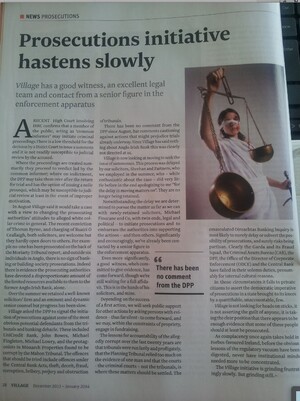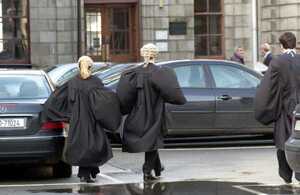[From the current issue of Village magazine]
Village magazine’s struggle for accountability in a world gone unnaccountable continues at a somewhat frustrating pace.
We asked Legal Coffee Drinker what it’s all about.
Broadsheet: “Legal Coffee Drinker, what’s it all about?”
Legal Coffee Drinker: “The right of private prosecution is a common law right which traditionally gave a private individual the right to initiate a criminal prosecution and continue that prosecution up to a certain stage in the criminal process, at which point the Director of Public Prosecutions (DPP for short) could decide whether or not to continue.”
Broadsheet: “Up to what stage, exactly?”
LCD: “Well, traditionally, indictable offences (offences capable of being tried by jury, which are really the only ones anyone is interested in for the purposes of white-collar prosecution) were subject to an initial preliminary examination in the District Court for the purpose of deciding whether or not there was an adequate case to return for trial. The private prosecutor got to continue the prosecution up to the very end of the preliminary examination process – giving them the chance to put evidence forward as part of this preliminary examination which might pressure the DPP into continuing with the prosecution.”
As stated by the Supreme Court (O’Dalaigh CJ) in State (Ennis) v Farrell [1966] “[a] private prosecutor who had adduced sufficient evidence to effect a return for trial might, as a general rule, rest assured that the Attorney General would thereafter carry the case to trial before judge and jury”.
Broadsheet: “So what happened if the DPP didn’t agree that the case should proceed? Could the judge send it through nonetheless?”
LCD: “No. However the private prosecutor could, in such circumstances, apply to the High Court to compel the DPP to move the case forward, by way of an application for judicial review of the DPP’s decision. To succeed it would have to be shown that one or more of the grounds for judicial review was present: that the DPP was acting unreasonably (the standard of proof here is very high), had ignored relevant considerations or had taken into account irrelevant considerations; had failed to act in accordance with fair procedures, with the evidence adduced at preliminary examination being put before the court as part of this review.”
Broadsheet: “And is this still the case?”
LCD: “No. The difficulty currently faced by private prosecutions is that the preliminary examination procedure in the case of indictable offences has been abolished by the Criminal Justice Act 1999. In Kelly v Ryan [2013], the case involving a private prosecution of IRBC officials referred to in the Village article, it was argued that this removed the right of private prosecution in the case of indictable offences, by effectively rendering such right redundant – the private prosecutor no longer had the opportunity in preliminary examination to put evidence before the court which could either pressure the DPP into continuing with the prosecution or show her decision not to prosecute was unreasonable or based on an irrelevancy.”
Broadsheet: “And did this argument succeed?”
LCD: “No. The High Court judge hearing the case, Judge Hogan, took the view that the right of private prosecution survived the coming into effect of the 1999 Act – at least in theory. He pointed out that the Supreme Court in Ennis had held that the right could only be abolished by clear language and there is no express statement in the 1999 Act regarding its abolition. Accordingly it must be taken to still subsist.”
Broadsheet: “Wonderful. Full steam ahead for private prosecutions then?”
LCD: “Not that simple [Drains coffee] Judge Hogan’s judgment – which is under appeal to the Supreme Court – accepts that the right of private prosecution still exists in theory. However in practice its significance has been reduced by the 1999 Act. The abolition of the preliminary examination procedure reduces the ability of the private prosecutor to put forward a case strong enough to publicly pressure the DPP into continuing with the case and/or make her decision not to do so judicially reviewable.”
“Judge Hogan’s decision confirms that there remains a right of private prosecution in respect of indictable offences. What still has to be determined is the value of that right in the absence of a preliminary examination process. We’re unlikely to find this out for some time since the effect of the pending Supreme Court appeal against Kelly Vs Ryan is to effectively put all private prosecutions on hold for the time being. As mentioned in a previous post, Supreme Court appeals are currently taking some time to be heard. [Drains coffee].”
Broadsheet: “It sounds like another case of ‘justice delayed is justice denied’ as the old saying has it?”
LCD: “Are we done?”
Broadsheet: “We are. Thank you Legal Coffee Drinker. Happy new year from all of us at Broadsheet.”
LCD: “Right bye.
Previously: Village Vs State




